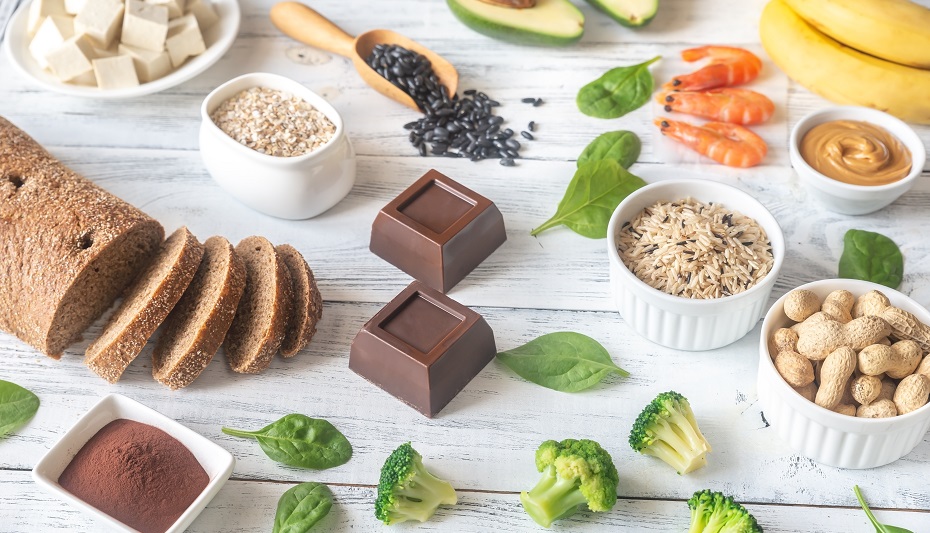

Magnesium is a mineral which we need in our diet every day to ensure continued good health. Magnesium is an important factor in healthy functioning of muscles, the nervous system, cardiovascular system and digestive tract. In the developing child magnesium is also important in the development of healthy bones and DNA.
Not Enough Magnesium
When someone is not meeting their recommended daily intake of magnesium they may begin experiencing symptoms of magnesium deficiency. These symptoms are most often seen in the muscles first, including muscle cramping, twitching or muscle soreness. Other symptoms that may occur with more advanced magnesium deficiency include fatigue, poor appetite, insomnia, poor memory, confusion and depression. Inadequate magnesium intake is quite common with only one half of Canadians actually reaching their daily requirement of magnesium1
How Much Magnesium Do I Need?
The daily requirement for magnesium is dependent on a person’s age and sex. Men 31 years of age and older require the most magnesium at 420mg per day while women 19-30 years of age require the least at only 310mg of magnesium per day. Women in general require less magnesium on a daily basis than men. Pregnant women require a bit more magnesium at 350-360mg per day to ensure the health of their developing child. During breastfeeding a woman’s daily requirement for magnesium drops back down to 310-320mg per day.
Where To Get Magnesium
The optimal method of getting the magnesium which we need is through the foods in our diet. Some of the foods richest in magnesium include nuts, seeds, beans and whole grains. Getting our daily requirement of magnesium is not always an easy thing to do and requires eating a variety of magnesium-rich whole foods on a regular basis. The food which is highest in magnesium by serving size is pumpkin seeds with a whopping 317mg of magnesium per ¼ cup. A single serving of pumpkin seeds will meet most women’s daily requirement for magnesium and cover 75-80% of a man’s daily magnesium requirement.
Some foods rich in magnesium:
- Pumpkin seeds (317mg per ¼ cup)
- Brazil nuts (133mg per ¼ cup)
- Sunflower seeds (120mg per ¼ cup)
- Cashews (90mg per ¼ cup)
- Peanut butter (50mg per 2 tbsp.)
- Black-eyed peas (121mg per ¾ cup)
- Tofu (45-80mg per ¾ cup)
- Salmon (92mg per 2.5 oz)
- Halibut (80mg per 2.5 oz)
- Wheat germ (96mg per ¼ cup)
- All Bran cereal (108mg per ½ cup)
- Rolled oats (50mg per ½ cup cooked)
Supplementing With Magnesium
Magnesium supplements can be helpful in treating the symptoms of magnesium deficiency when getting enough magnesium through the diet is exceedingly difficult or in cases of nutrient malabsorption due to intestinal disorders. Magnesium supplementation can potentially be dangerous for certain people including people with kidney failure or dehydration.
Blood Test
Blood tests for magnesium will typically not pick up low-grade magnesium deficiency which can cause mild symptoms such as muscle cramping or soreness. High levels of magnesium in the blood may be caused by kidney failure, excessive magnesium intake, lithium treatment, hypothyroidism, Addison’s disease, familial hypocalciuric hypercalcemia or milk alkali syndrome. Talk to your naturopathic doctor or medical doctor before starting a magnesium supplement to make sure it is safe and appropriate for you to be taking.
References
- Health Canada. Canada.ca, Government of Canada, 15 Mar. 2012, www.canada.ca/en/health-canada/services/food-nutrition/food-nutrition-surveillance/health-nutrition-surveys/canadian-community-health-survey-cchs/canadian-adults-meet-their-nutrient-requirements-through-food-intake-alone-health-canada-2012.html#b1.


